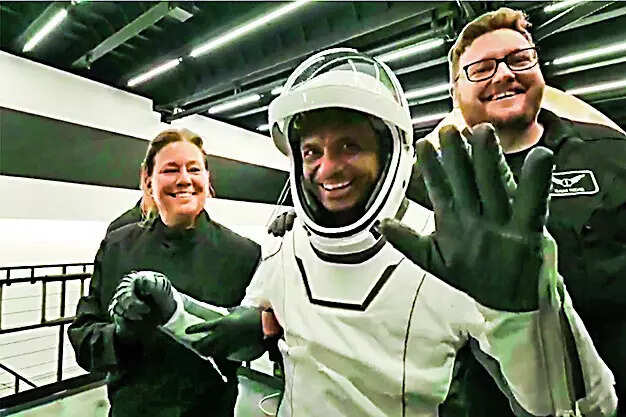Shubhanshu Shukla Returns to Earth After Historic Mission
BENGALURU: Indian astronaut Shubhanshu Shukla, known as Shux, has safely returned from the International Space Station (ISS) on July 15. According to initial medical evaluations, he is in good health with no immediate concerns. Shux, who made history as India’s first astronaut to participate in a commercial space mission, is currently undergoing a week-long post-flight rehabilitation in Houston.
Shux was part of the Axiom-4 (Ax-4) mission, which marked a significant milestone for India’s space program. The mission focused on various scientific experiments and international collaboration. Now, he is following a detailed medical routine that includes cardiovascular assessments, musculoskeletal tests, and mental health monitoring. This process aims to help him regain his physical strength and adapt back to normal Earth activities.
Upon returning to Earth, Shux was extracted by SpaceX recovery teams and underwent preliminary health checks aboard the recovery ship. He was then transported to the mainland for more comprehensive medical evaluations and mission debriefing sessions. His current care is under the supervision of Axiom Space’s flight surgeon in Houston, with support from Isro’s medical team.
Tolong support kita ya,
Cukup klik ini aja: https://indonesiacrowd.com/support-bonus/
Addressing the Effects of Microgravity
The rehabilitation phase is crucial for mitigating the effects of microgravity, which can impact several aspects of an astronaut’s health. Prolonged exposure to microgravity can lead to changes in cardiovascular function, muscle atrophy, bone density loss, and psychological challenges. Therefore, Shux’s medical routine is designed to address these issues effectively.
During his time on the ISS, Shux worked closely with the Axiom-4 crew and Expedition 73 members. He contributed to the daily operations of the station and supported joint science, maintenance, and outreach efforts. His role included participating in integrated crew timelines, sharing resources in the Harmony module, and coordinating multiple crossover activities. These efforts fostered international cooperation in space exploration.
Scientific Contributions and International Collaboration
The Ax-4 mission also involved the collection of over 580 pounds of scientific samples and hardware from more than 60 experiments. These experiments spanned various fields, including life sciences, materials research, Earth observation, and technology demonstrations. The research was conducted by scientists from 31 countries.
Principal investigators will now analyze the collected samples and data. Studies covered topics such as microgravity effects, suit fabrics, muscle stimulation, micro-algae systems, and environmental psychology. While some scientific publications may take time, the findings are expected to contribute significantly to global knowledge.
In addition to scientific work, the crew engaged in over 20 outreach events, interacting with students, officials, and researchers worldwide. These interactions aimed to inspire future generations and promote space exploration.
A Vision for the Future of Commercial Spaceflight
Axiom Space CEO Tejpaul Bhatia highlighted the significance of the Ax-4 mission. He emphasized that the mission demonstrated the potential of commercial spaceflight in enabling astronauts from different nations to conduct scientific research in space.
“By enabling astronauts from India, Poland, and Hungary to carry out scientific research aboard the space station, we are supporting these nations in their contributions to human spaceflight. This mission reflects Axiom’s vision of a thriving low-Earth orbit economy, where access to space is no longer limited to a few, but extends to all who seek to explore, discover, and innovate,” he said.
As Shux continues his rehabilitation, the focus remains on ensuring his well-being and preparing him for a smooth transition back to everyday life. His successful mission marks a new chapter in India’s space endeavors and highlights the importance of international collaboration in advancing scientific knowledge and space exploration.







